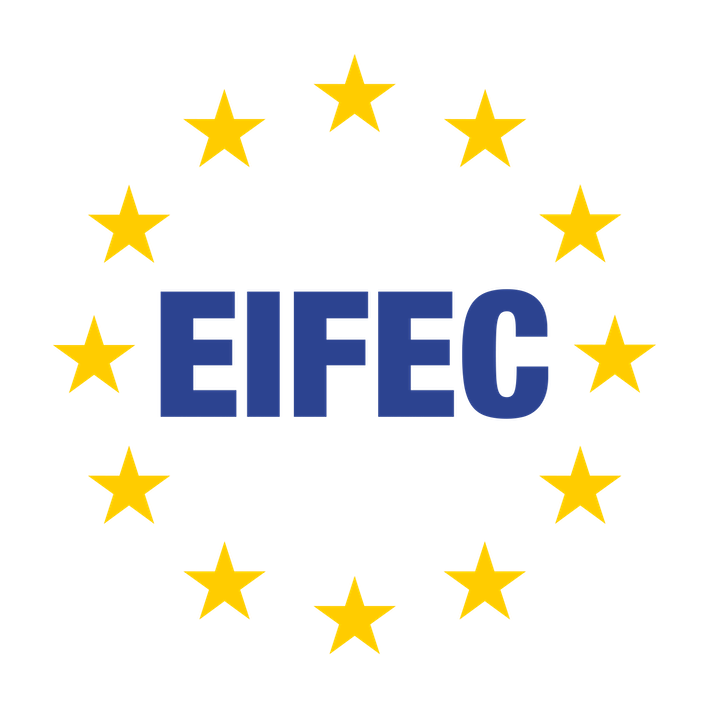EU FRAMEWORK ECF
EXPORT COMPLIANCE DEFINED
- EXPORT COMPLIANCE
- EU-ECF FRAMEWORK
- EU CODE (EU-CEC)
- EU GUIDELINES (EU-ECGL)
- EU CERTIFICATION (EU-C/ECO)
- EU REGISTER (EU-ECR)
- EIFEC NUMBER (ERN)
- STANDARDS EU EC1001
“Export Compliance” is the specialized multidisciplinary framework/discipline which covers all activities of Export (i.e. goods and services, tangible and intangible Items, transfer of means of payment), that are somehow subject to Export controlling regulations (i.e. Dual Use, Sanctions etc.) applicable to Transactions between two different states/jurisdictions/ entities. It provides support to Organisations in Compliance Risk Management, i.e. the risk of legal or administrative sanctions, financial losses or reputation deterioration for failing to comply with laws, regulations and legislations, codes of conduct and good practices.
“Export” means any Transaction or interaction subject to legal control in accordance with applicable jurisdiction’s definitions. It includes, in a broader sense, any “import” since each export entails an import as an indissoluble operation (trade).
“Compliance” means the act or process of being in conformity with external applicable regulations, guidelines and relevant laws, including legislative requirements to meet all the organization’s compliance obligations.
“Organisations” refers to, but is not limited to, all private or public bodies, companies of any nature, associations, universities, research institutes etc. that have activities falling within the scope of Export Compliance Standard Code EU-CEC
“Item” stands for “product, service, software and technology, whether tangible or intangible”.
“Transaction” encompasses virtually any kind of interaction, including but not limited to selling, purchasing, loaning, licensing, renting, quoting, returning, repairing, providing services, providing samples, visiting, meeting, training, making or receiving payment, hiring, mergers and acquisitions, accessing controlled data and collaborating in research involving controlled data.
“Internal Compliance Program” (ICP) means, as general definition, effective, appropriate and proportionate means and procedures (including the development, implementation and adherence to standardised operational compliance policies, procedures, standards of conduct and safeguards) developed by Organisations to ensure compliance with the provisions and with the terms and conditions of relevant laws.
“ECAP” (Export Compliance Administration Program) is the ICP specialized in Export Compliance with international, European and national regulations, based on EIFEC EC1001 series Export Compliance International Standards.
EU-ECF framework provides innovative solutions to the most critical challenges in a global marketplace becoming a very complex arena for businesses to navigate.
Major events have produced legislations and regulations at international and national level; the complexity of legal frameworks is shaping the way organizations do their business.
If originally the threat of dual-use items being used for wrongful purposes was the main concern, today challenge covers all activities of import and export of goods and/or services, tangible and intangible assets (including the transfer of means of payment, that somehow are subject to regulations applicable to transactions between two different states/jurisdictions.
In a globally integrated world, efficient export compliance is only possible with co-operation at a European and international level.
The EU Governments rely on the due compliance of exporters to help ensure that all laws are abided.
The strategic Response is the specialized multidisciplinary EU Export Compliance Framework (EU-ECF) that supports the organization’s business objectives, identifies the boundaries of legal and ethical behavior, and establishes a system to alert management when the organization is getting close to (or crossing) a boundary or approaching an obstacle that prevents the achievement of a business objective.
EU-ECF includes:
EU Code of Export Compliance (EU-CEC), which set the principles, best practice and Standards for the import/export industry to be adopted by EU and not EU organizations.
EU Export Compliance Guide Lines (EU-ECGL) for implementing the EU-CEC
EU Export Compliant Organization certification (EU-C/ECO) to verify the proper EU Export Compliance behaviours and processes.
EU Export Compliance Register (EU-ECR) with the purpose to enhance the implementation of EU Export Compliance best practice. A Register for Organizations and self-employed individuals engaged in EU import/export and policy implementation has been activated
EIFEC Registration Number (ERN) is attributed for the purpose of identifying organizations or persons in order to ensure their traceability on an EU level. This prevents abuse and allows to establish the identity of the Certified Organization in a simple way.
EIFEC EC1001 STANDARDS series are principles-based standards to help organizations become more accountable, transparent and after all competitive. They address issues affecting governance, export models and organizational strategy, as well as providing operational guidance on export management and stakeholder engagement.
The European Code of Export Compliance (EU-CEC) aims to encourage the dissemination of good practices in Export Management Compliance as defined in the EU Export Compliance Framework (EU-ECF) with all EU and non EU actors in Export Compliance involved in import / export of goods and services.
The purpose of the Code is to provide Organizations with an internationally accepted, easy available set of principles to frame and structure the way in which they understand, govern, administer, implement, evaluate and communicate their Export Compliance.
Principles are primarily intended for use by organizations developing an accountable and strategic approach to Export Compliance. They will help such an organization understand, manage and improve its Compliance performance.
The value of these principles lies in their comprehensive coverage and the flexibility of their application.
Those who adhere to this self-regulatory code will find the basic principles, values, practices and standard to implement effective management programs in line with the EU and National States regulations (Compliance).
This edition updates the previous edition of September 2010. The principles and values are kept unchanged, but take account of the experiences and real monitoring and control have occurred during these months.It takes also into account the changes (legislative and practice) that occurred during this period and especially of the latest EU regulations.
This Code describes the guiding principles and practices to promote an European culture of compliance with the rules and laws (Compliance) within the financial, economic, industrial, associative system of private and public sectors.
EIFEC aim to contribute by all appropriate steps to disseminate among the Organizations behaviors of excellence through proper management, transparency and audit of the activities performed in the production and transfer of goods and services.
You will determine how to support the operational management of compliance risk, i.e. the risk of legal sanctions (civil and / or criminal) or administrative, financial losses or deterioration/loss of reputation for non-compliance with laws and regulations applicable rules, codes of conduct and good practices.
EIFEC has prepared, based on the EU-CEC and EIFEC 1001 Standards a set of Guidelines for the following categories:
• EU Organizations (General Export Compliance). These Guidelines promote good Export Compliance practices and have been developed to help Organizations to create an effective European Export Compliance Administration Program (EU-ECAP) that will minimize the risk of noncompliance with export laws.
• Non EU Organizations (specific for countries as Iran, Syria etc.) These Guidelines promote sound Export Compliance practices to help Non EU Organizations to comply with EU Regulations and to be certified as EU Certified Export Compliant Organization (EU-C/ECO).
• EU Export Compliant Certification (for Certifying Agents). These Guidelines provide the framework for Audit, Certification Agents and other accredited entities to carry out the verification and certification of Organizations in relation to EU-CEC and EU Charter membership
Compliance assessment is defined as a "demonstration that specified requirements relating to a product, process, system, person or body are fulfilled." There are many of these compliance assessment activities applied in today’s marketplace including accreditation, certification, inspection, registration, supplier’s declaration, and testing.
The one dimension that EIFEC is directly engaged with is accreditation and certification.
Ultimately, the marketplace and customers of compliance assessment services measure the beneficial value of Certification. For most suppliers, the primary benefit of accredited third-party certification is to meet a purchaser’s or regulator’s requirement for this independent evaluation of Compliance.
Increasingly, suppliers’ procurement organizations are specifying and government agencies are recognizing accredited, third-party certification as an optional dimension of their systems for risk management.
In the rapidly growing complex area of EU export laws, EIFEC verification, validation and certification bodies have recognition of the EU Export Compliance programs for Organizations and individuals.
Undergoing the EU Export Compliance Certification process signals a clear indication that an organization desires to have a competitive advantage by undergoing a voluntary evaluation.
Encourages marketplace confidence in EU Certified Export Compliant Organization (EU-C/ECO) by their undergoing regular impartial and independent audits by an internationally respected body.
The EU Export Compliance Register (EU-ECR) has been set up to offer a single EU Code of Conduct and EU Export Compliance Commitment, binding all Organizations and self employed individuals which accept to “play by the rules” in full respect of ethical principles.
It provides Institutions and Organizations with a direct and single access to information about who is committed to:
Promote and disseminate excellency behaviors through managerial correctness, transparency and verifiability of export activities.
Operate within an Export Compliance Framework in line with EU regulations and National States laws.
In addition the EU Export Compliance Register is listing:
All Organizations that have adopted the EU-CEC and have successfully past the verification/ certification process becoming so a EU Certified Export Compliant Organization (EU-CECO)
EIFEC Registration Number (ERN), which is the ID number of a Certified Organization and Certification Expiry date, which allows EU National Authorities or Registered Financial Institutions to verify the updated certification validity when needed.
A complaint and sanctions mechanism ensures the enforcement of the rules and to address suspected breaches of the code and or the EU-CEC.
The European Export Compliance Register has been set up and is operated by the EIFEC Register Secretariat (ERS) of the European Institute for Export Compliance.
GO TO THE REGISTER (METTERE URL)
EIFEC acts as the European Registration Secretariat for all registrant to the EU Export Compliance Register (EU-ECR).
An EIFEC Registration Number (ERN) is attributed for the purpose of identifying organizations or persons in order to ensure their traceability on an EU level.
This prevents abuse and allows to establish the identity of the Certified Organization in a simple way.
The ERN is available for consultation only to those who are entitled as Eu National Authorities or Registered Financial Institutions.
Organizations that have received the EU Certified EU Certified Export Compliant Organization (EU-C/ECO) Certification can use the ERN in all their communications with any parties to allow the authentication that the Certification is still valid.
The EIFEC EC1001 STANDARDS series are principles-based standards to help organizations become more accountable, transparent and after all competitive.
They address issues affecting governance, export models and organizational strategy, as well as providing operational guidance on export management and stakeholder engagement.
The EIFEC EC1001 standards are designed for the integrated thinking required by complex global economy.
The Standards are developed through a multi-stakeholder consultation process and are used by a broad spectrum of organizations -- multinational businesses, small and medium enterprises, governments and civil societies.
EC1001OPS provides a framework for an organization to identify, prioritize and respond to its export compliance challenges
EC1001ECOS Export Compliance Officer standard provides a methodology for Export Compliance practitioners to evaluate the nature and extent to which an organization adheres to the Export Compliance Code Principles.
For more information


